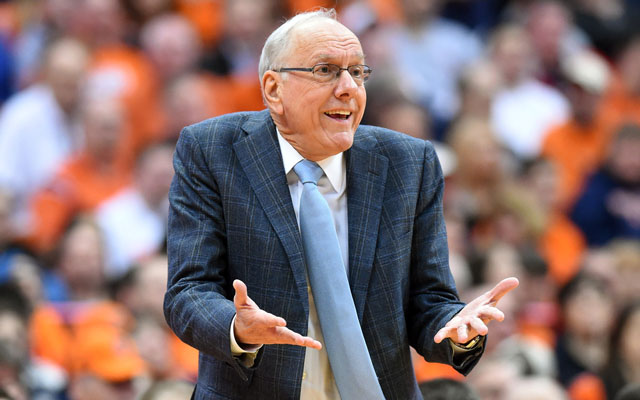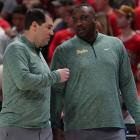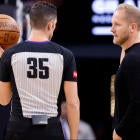There has been quite a bit of talk lately about the effect of injuries, suspensions and other roster issues on the selection process. Fans of teams like Wichita State and LSU (who have suffered key injuries) and Syracuse (which went 4-5 under Mike Hopkins during coach Jim Boeheim's NCAA-imposed nine-game suspension) are hoping that some roster issues that impacted them at some point during the season will be taken into consideration during the bracketing process. If that's what they are hoping for, they are likely to be disappointed.
The NCAA selection committee has always said such things are "taken into consideration" during their proceedings, but the reality is that in only one circumstance would you ever notice such consideration. That circumstance is a season-ending injury to a key player -- and that consideration always works against a team.
There have been a couple of notable cases of that. The most recent was in 2010, when Purdue was well on its way to a Big Ten championship and a No. 1 seed. Those plans were derailed in late February when Robbie Hummel tore an ACL at Minnesota. Purdue wasn't quite the same after that, and even though they were able to win the Big Ten regular season title and put together a profile worth of a No. 2 seed, the committee docked them to a No. 4 seed.
The most famous instance of something like this was in 2000, when Kenyon Martin of Cincinnati broke his leg in the first few minutes of the Bearcats' first round game in the Conference USA tournament. Cincinnati was the No. 1 team in the country at the time and Martin was the national player of the year. The Bearcats lost that game to Saint Louis and not only did the committee not keep them as the overall No. 1, they made them a No. 2 seed.
That's how injuries and roster issues are considered. There hasn't been a case of a team without a tournament-worthy profile being selected due to the committee "considering" losses incurred while a key player was injured. Your team isn't going to be the first. There hasn't been a noticeable case of a team's seed being artificially high because of such consideration. There also hasn't been a case of a team that is near the cut line for selection being left out because of a season-ending injury to a key player.
So, there is no point in hoping that all the excuses you might have for your team's losses are going to erase those losses from your team's profile. That's not going to happen.
And, that's how things have to be. What else could the committee do? Should they pretend those games didn't happen? Should they assume a team would have won if it played at full strength? It's pretty obvious they can't do that. Why play the game if it's going to be ignored? If that's how it's going to be, Wichita State should have just cancelled its games when Fred Van Vleet was injured since they weren't going to count anyway.
Maybe you think those losses should be "discounted," but how does the committee do that? Are they supposed to count it has half a loss? Three-quarters? What about the opponents in those games? Do their wins not count or count for less? What if both teams have injured players? Does the committee have to decide which team's injuries are more impactful?
No, the committee can't do any of that. Even if they wanted to, the work involved would be overwhelming. Cases like Purdue and Cincinnati in the past are easier to deal with, although I would argue that the committee should just judge those teams on what they accomplished instead of docking them. At least accounting for that situation is manageable.
It's unfortunate for some teams that injuries may have undone some part of their season, but that's sports. It happens sometimes. The reality is that almost everybody has roster issues at some point during the season. The committee needs to judge teams on what they did. They can't judge teams on what they assume they would have done.





















